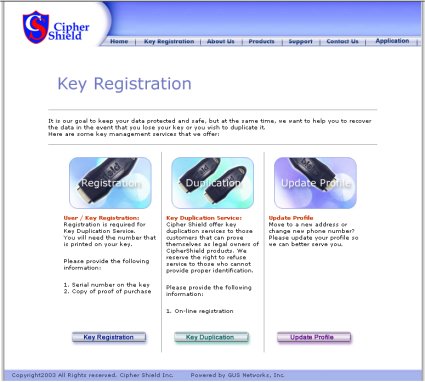Locking Down Your Data with Cipher Shield External Hard Drive Encryption
Playing It Safe: Registering The Encryption Key
Cipher Shield lets you register the keys in case you lose them. If the keys ever do get lost, customers can contact Cipher Shield (www.ciphershield.com) for replacement keys.
Setup: Plug And Play
The Cipher Shield is very simple to operate and user-friendly. All you have to do is connect the included cable to a free USB port on your computer. Within seconds WindowsXP identifies a USB mass storage device and lists the Cipher Shield as a hard drive in the Device Manager. The hard drive was correctly identified as a Toshiba MK4025GAS and we were immediately granted access.
Locking Device: Unplugged, Yet Safe!
The moment you pull out the Cipher Key, access to the hard drive is denied immediately - the hard drive vanishes from the list in the Device Manager. If you insert the key again, Cipher Shield is instantly recognized and ready to use.
Software Encryption: An Alternative?
It is also possible to encrypt data through the use of software like PGP (Pretty Good Privacy). Software has one great disadvantage, though: encryption keys or passwords have to be stored somewhere because they are too long to remember.
Unfortunately, this also means that wherever data is stored, it can be read, copied and - if worst comes to worst - stolen. If the encryption key isn't changed regularly, unauthorized users can either get their hands on important data or change the key as they wish. With Cipher Shield, unauthorized users would first have to get their hands on the hands on the hardware key in order to access the encryption key. If the user notices that this is missing, he or she can at least lock up the Cipher Shield until an alternative is found.
Get Tom's Hardware's best news and in-depth reviews, straight to your inbox.
Current page: Playing It Safe: Registering The Encryption Key
Prev Page Ports Next Page Test Configuration
Patrick Schmid was the editor-in-chief for Tom's Hardware from 2005 to 2006. He wrote numerous articles on a wide range of hardware topics, including storage, CPUs, and system builds.
